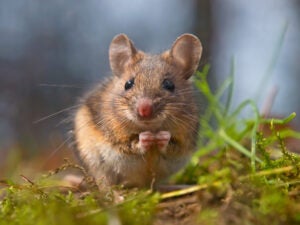
LONDON—The public’s use of glue traps to catch mice and rats will be banned across England after a government-backed Private Members Bill received unanimous support during its third and final reading today in the House of Lords. The ban has been welcomed by animal charity Humane Society International/UK, which led the “Unstuck” campaign to end the public use of the “inhumane, indiscriminate and indefensible” glue boards, which immobilise the small mammals in strong adhesive in which they can suffocate, rip off skin and fur and break their limbs in desperate efforts to escape.
Despite their potential to cause prolonged and extreme animal suffering, glue traps are currently widely sold to the public in DIY and corner shops, as well as online, for as little as 99p. The traps also pose a serious risk to other species, with numerous reports each year of animals—including protected and endangered species like hedgehogs, wild birds and bats, and even pet cats—being caught and suffering often fatal injuries.
The legislation contains a limited exemption for so-called “pest” control operatives to apply to the Secretary of State for a licence to use a glue trap, which may be granted where there is “no other satisfactory solution” and where the action is required for “the purpose of preserving public health or safety”. The exemption mirrors that of the 2015 glue trap ban in New Zealand, where glue trap licences have fallen year on year since the ban’s introduction, with no approvals for use in 2021.
Claire Bass, executive director of Humane Society International/UK, said: “Glue traps are crude devices that cause horrific suffering to millions of animals. It is absolutely right that their public use will be banned, and we hope this will precipitate their removal from sale by retailers since it will be illegal for their customers to use them. It is immoral to subject small, sentient wildlife to being immobilised on these sticky boards, only to suffocate in the glue, die slowly of their injuries, or be ineptly killed by unprepared members of the public who resort to drowning or throwing them in the rubbish while still alive. The licensing regime for glue trap use by the ‘pest’ control industry will need to be strictly managed to ensure that these cruel products are no longer casually used with impunity.”
Once the Bill receives Royal Assent, the new law will make it an offence in England for a member of the public or any “pest” controller without a licence to set a glue trap to either deliberately or accidentally catch a rodent, with a fine and/or up to 51 weeks in prison. Discovering a glue trap but failing, without reasonable excuse, to ensure it is disabled will also constitute an offence.
Naturalist and campaigner Chris Packham, who supported HSI/UK’s Unstuck campaign, joined the charity in welcoming the ban, saying: “When wildlife, like mice and rats, are successful at living alongside humans, we label them ‘pests’ or ‘vermin’ and seem to think that’s a green light to completely disregard their welfare. Glue traps are a prime example of this. That attitude has to change. I commend HSI/UK on their Unstuck campaign victory and I’m delighted that cruel and unnecessary glue traps will now be taken out of public use, prompting a more compassionate and also effective approach to dealing with unwanted wildlife. This law is great news for mice and rats, but also for the many unintended victims who get stuck in the glue, such as delicate birds, grass snakes, frogs and hedgehogs.”
Conservative MP Jane Stevenson, who sponsored the Bill, said: “I am absolutely thrilled that my Glue Traps Bill has passed its Third Reading, meaning it will soon receive Royal Assent and become law. The banning of the use of glue traps by the general public is another step forward in the strengthening of animal welfare legislation in England, and I want to thank everyone involved in making this happen. The use of glue traps is cruel and barbaric, and has often led to animals not intended to be caught in these traps dying in the most inhumane way. Together with ministers at Defra and organisations such as HSI/UK, the RSPCA and others, I am pleased to have made a positive difference.”
HSI/UK advocates an ethical approach to wildlife management, addressing the root cause of problems through human behaviour change strategies and wildlife control and mitigation measures that are humane, with lethal interventions used only as a last resort to protect public health and safety. As well as being inhumane, killing animals like mice and rats typically does not offer a permanent solution to the problems their presence might cause, whereas measures such as removing food sources and blocking up access holes are effective in addressing such situations.
The ban will come into effect in England two years after receiving Royal Assent. In Scotland, the government made a commitment in January this year to ban glue traps following a review by the Scottish Animal Welfare Commission, and the Welsh government has also been seeking stakeholder views on a possible ban.
ENDS
Media contact: Wendy Higgins, director of international media: whiggins@hsi.org
